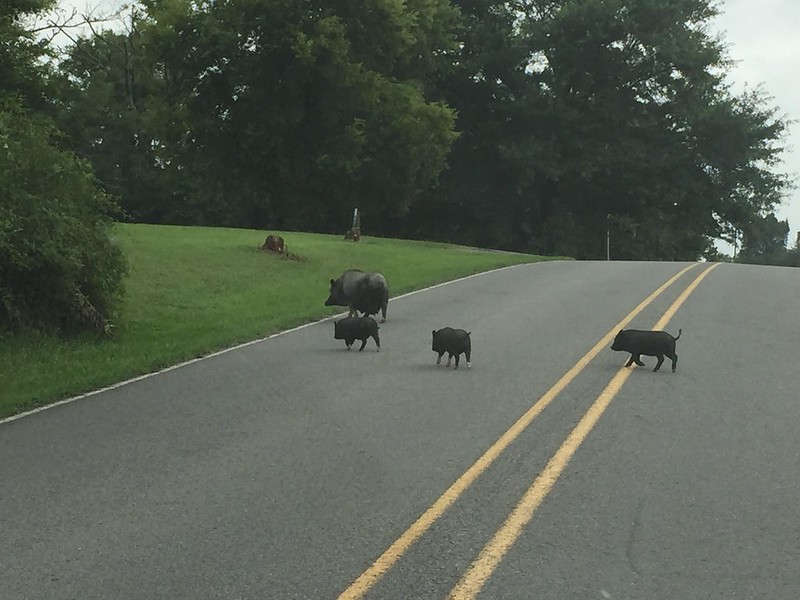Learn trapping, surveillance at feral hog workshops set for Aug. 27, Sept. 19
By Mary Hightower
The Cooperative Extension Service
U of A System Division of Agriculture
Fast facts
- Two feral hog workshops set for Aug. 27 at Hope, Sept. 19 at Colt
- Agenda features Extension, Game & Fish Commission, AFRC personnel
- Experts to discuss trapping, surveillance, hog biology
- RSVP to county agent, no cost to attend, seating is limited
(525 words)
LITTLE ROCK – Ruined lawns, fox holes wallowed into pastures and devoured farm crops are just part of the estimated $1.5 billion in annual damage and control costs linked to feral hogs nationwide.
“The explosive growth of feral hog populations has caused an immense amount of frustration for farmers and landowners across Arkansas,” said Becky McPeake, extension wildlife specialist for the University of Arkansas System Division of Agriculture.

HOGS -- Feral hogs are smart and highly adaptable, even being spotted in urban areas. Here, a sow and piglets cross a road near Conway, Arkansas. Taken July 8, 2015 (CREDIT MANDATORY: Photo by Scott Patrom)
“People have shot at hog or put a trap out thinking that’s all they had to do to gain control, but they’re getting outsmarted by the pigs,” she said. “Feral hogs are not comfortable around humans and once the pigs encounter humans, they tend to become less visible. They are highly adaptable and will do what is necessary to survive.”
McPeake also said “the problem isn’t limited to just rural areas, they’re now being reported near urban areas like Conway.”
To address the issue, the Cooperative Extension Service, the Arkansas Forest Resources Center and Arkansas Game and Fish Commission are hosting two feral hog workshops in the coming weeks.
“Trapping and managing hog populations takes time and a lot of planning,” she said. “We will be presenting research-based methods that landowners can implement to help control destructive hog populations.”
The first meeting is set for Thursday, Aug. 27, at the Southwest Research and Extension Center in Hope. There’s no cost to attend, but seating is limited. Please RSVP to your county extension office by Aug. 20. A head count is needed for dinner.
The second will be held Saturday, Sept. 19, at the Pine Tree Research Station in Colt. There is no cost to attend. RSVPs are due Friday, Sept. 11, to the county extension office. A head count will be needed for lunch.
Program expenses are sponsored by the Natural Resources Conservation Service and meals are sponsored by the Arkansas Forestry Association.
Agenda for Aug. 27 evening meeting at Southwest Research and Extension Center, Hope:
- 6 p.m. - Registration, welcome and dinner
- 6:35 p.m. - Natural History, Biology and Removal Options for Feral Hogs, Becky McPeake, U of A System Division of Agriculture/Arkansas Forest Resources Center
- 7:10 p.m. - Outdoor Trap Demonstrations: Economical Homemade Gate
- Caroll Guffey, U of A System Division of Agriculture/Arkansas Forest Resources Center;
- Electronic Whole-Sounder Trap, Jeff Taverner, Arkansas Game and Fish Commission
- 7:30 p.m. - Using Trail Cameras for Feral Hog Surveillance, Skip Armes, Searcy County Cooperative Extension Office
- 8:15 p.m. -How To Trap Feral Hogs, Jeff Taverner, Arkansas Game and Fish Commission
- 8:55 p.m. - Adjourn
Agenda for Sept. 19 daytime meeting at Pine Tree Research Station, Colt:
- 8:30 a.m. - 9 a.m. Registration and welcome.
- 9:05 a.m. - Natural History, Biology, and Feral Hog Sign, Becky McPeake, U of A System Division of Agriculture, Arkansas Forest Resources Center
- 9:45 a.m. - Feral Hog Hunting and Trapping Regulations, J.P. Fairhead, Arkansas Game and Fish Commission
- 11 a.m. - Controlling Feral Hogs on Your Property, Josh Green, Arkansas Game and Fish Commission
- 12:45 p.m. - Trap Demonstration & Feral Hog Damage Field Tour, Josh Green, Danny Denny and David Covington, Arkansas Game and Fish Commission
- 2 p.m. - Adjourn
To learn more wildlife management, contact your county extension office or visit www.uaex.uada.edu.
The Arkansas Cooperative Extension Service is an equal opportunity institution. If you require a reasonable accommodation to participate or need materials in another format, please contact your County Extension office (or other appropriate office) as soon as possible. Dial 711 for Arkansas Relay.
Pursuant to 7 CFR § 15.3, the University of Arkansas System Division of Agriculture offers all its Extension and Research programs and services (including employment) without regard to race, color, sex, national origin, religion, age, disability, marital or veteran status, genetic information, sexual preference, pregnancy or any other legally protected status, and is an equal opportunity institution.
# # #
Media Contact: Mary Hightower
Dir. of Communication Services
U of A Division of Agriculture
Cooperative Extension Service
(501) 671-2126
mhightower@uada.edu
Related Links